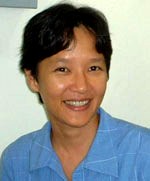2 April 2010
PRESS RELEASE
What will be the next violation of human rights in Indonesia?
First there was the Aceh Legislative Council that passed the Qanun Jinayat punishing adultery and homosexual conduct with stoning to death and caning. Then there was the
Constitutional Court decision upholding the Anti-Pornograhy law that criminalizes
homosexuality, and leaves room to criminalize sensuality violating especially cultural
minorities’ freedom of expression. Finally there came the mobs attacking the ILGA Asia Conference participants in broad daylight of Surabaya.
On March 23rd the Indonesian police cancelled the regional Asia Conference of the International Lesbian, Gay, Bisexual, Transgender and Intersex Association (ILGA) that was to be held in Surabaya through 26 – 28 March and was to be attended by more than 150 activists representing 100 organizations from 16 Asian countries. It is claimed that the police cancelled the conference due to pressures and threat of attacks from conservative Muslim groups, though in fact the duty of the police was to deter such attacks.
As the inability of a state and its law enforcement units to protect the freedom of expression and association can only reflect institutional discrimination and systematic intimidation against human rights advocates.
On March 26th, these groups did indeed attack the Conference participants in the Oval Hotel where they were trapped, having arrived in Surabaya unaware of the last minute cancelation, and unable to leave the city.
We know that the freedom of association is protected by the law in Indonesia, and we also know that though not required by law, the Organizing Committee had received the permit for the conference and that this permit was withdrawn by the police in Surabaya, which allegedly feared violent attacks by radical Islamic groups.
Yet the same police had no fear dining with the attackers in the lobby of the Oval Hotel, while the mob harassed the Conference participants subjecting them to verbal and physical abuse. The mob also sealed the office of GAYa NUSANTARA, the local organization that hosted the conference. This office is still closed and human rights activists in Surabaya are still under the threat of further attacks.
In a country such as Indonesia that prides itself on its diversity, and is supposed to uphold the universal principles of human rights, these acts of violence and intimidation against human rights activists are simply and completely unacceptable. In a democratizing country such as Indonesia, the duty of the state, its legal instruments and its police is to guarantee the constitutional right of association of the people, and not to deprive them of this right by sheltering pressure groups that wrongfully use the name of Islam to further their political agendas.
As 38 leading non-governmental organizations and academic institutions from 16 countries in the Middle East, North Africa, South and South East Asia, we call upon the
members of the press to spread the news on these outrageous violations of human rights,
so that the authorities take immediate and solid action to guarantee the safety of the Conference organizers and participants who are still in Surabaya, and reopen the doors of GAYa NUSANTARA and safeguard the security of all its members.
Coalition for Sexual and Bodily Rights in Muslim Societies (CSBR)
Coordination Office: Women for Women’s Human Rights (WWHR) – New Ways, TURKEY
AAHUNG, PAKISTAN
Association des Femmes Tunisiennes pour la Recherche et le Développement (AFTURD),
TUNISIA
Ahfad University for Women (AUW), SUDAN
AMARGI, TURKEY
Association Marocaine des Droits des Femmes (AMDF), MOROCCO
Asian-Pacific Resource & Research Centre for Women (ARROW), MALAYSIA
Association Démocratique des Femmes du Maroc (ADFM), MOROCCO
Association Tunisienne des Femmes Démocrates (ATFD), TUNISIA
BRAC University, BANGLADESH
Collectif Maghreb Egalité, ALGERIA
Egyptian Initiative For Personal Rights (EIPR), EGYPT
GAYa NUSANTARA, INDONESIA
HELEM, LEBANON
Indonesian Women Association for Justice (APIK), INDONESIA
Institut Pelangi Perempuan (IPP), INDONESIA
IWRAW-AP, MALAYSIA
Jordanian Women’s Union, JORDAN
LAMBDAISTANBUL LGBTT Association, TURKEY
Lebanese Council to Resist Violence Against Women (LECORVAW), LEBANON
MADA al-CARMEL – Arab Center for Applied Social Research, PALESTINE
Malaysian AIDS Council (MAC), MALAYSIA
Meem, LEBANON
Muntada – Arab Forum for Sexuality, Education and Health, PALESTINE
New Woman Foundation (NWF), EGYPT
Pilipina Legal Resources Center (PLRC), PHILIPPINES
Rassemblement Contre la Hogra et pour les Droits des Algériennes (RACHDA), ALGERIA
RAHIMA, INDONESIA
RESEAU WASSILA, ALGERIA
Sisters Arabic Forum (SAF), YEMEN
Sisters in Islam (SIS), MALAYSIA
Synergie Civique, MOROCCO
VISION, PAKISTAN
Women’s Center for Legal Aid and Counseling (WCLAC), PALESTINE
Women Against Violence (WAV), PALESTINE
Women’s Aid Organization (WAO), MALAYSIA
Women’s Health Foundation, INDONESIA
The Queen Zein Al Sharaf Institute for Development (ZENID), JORDAN






